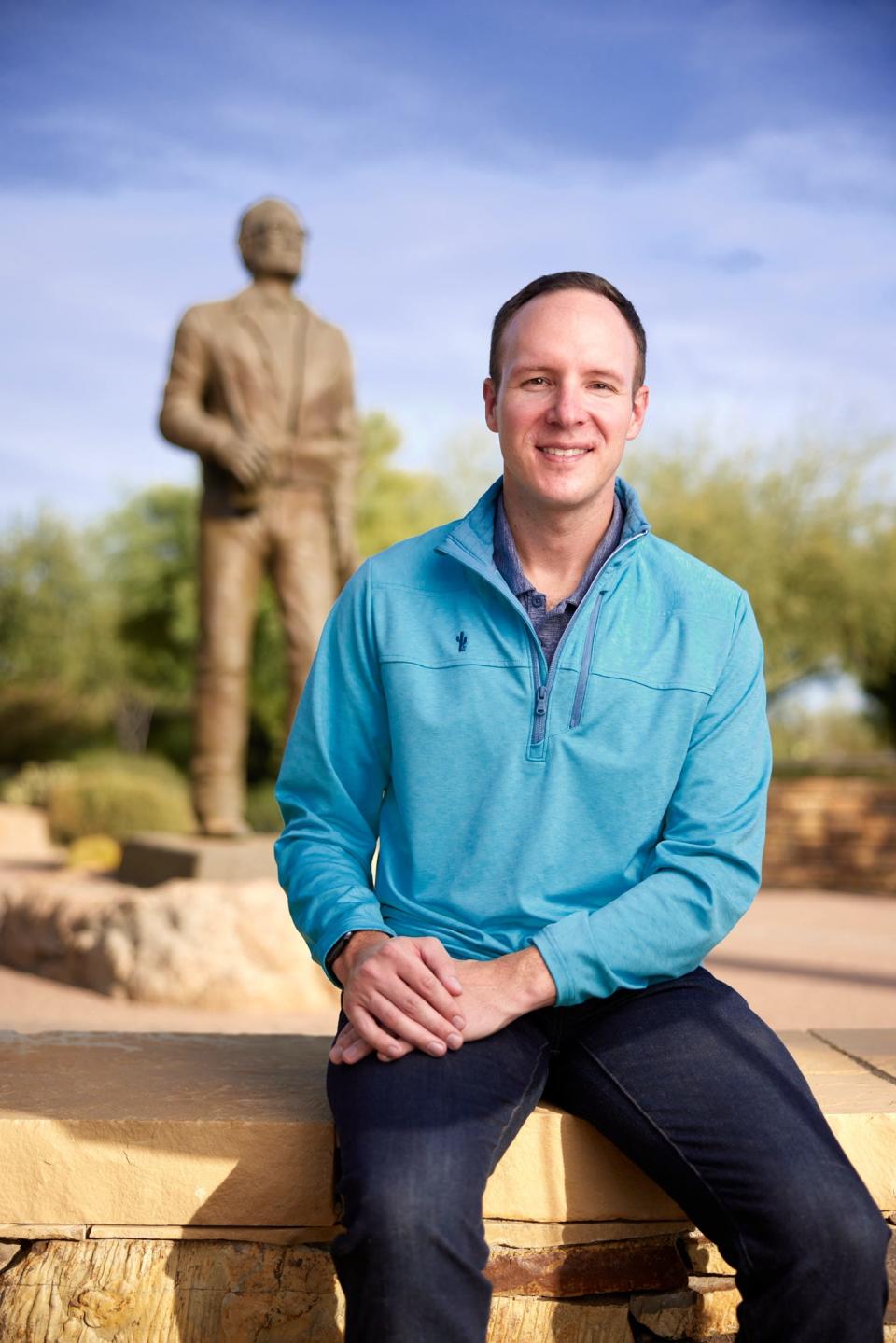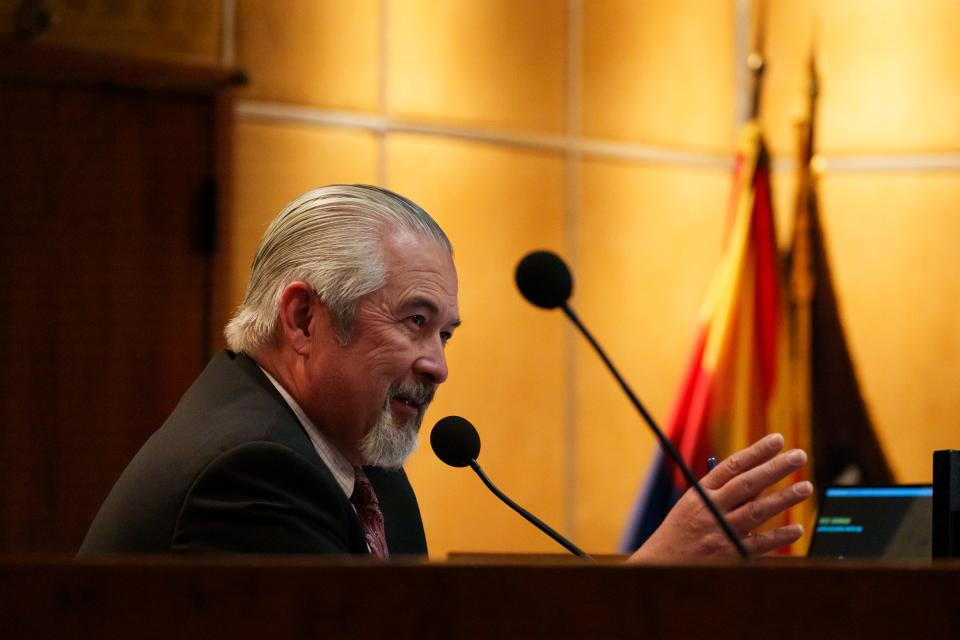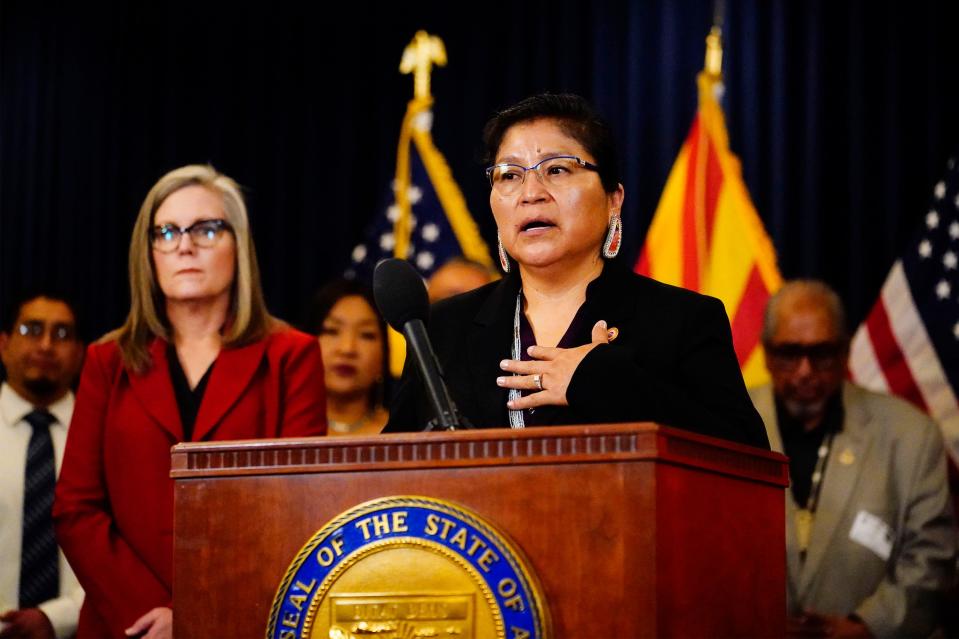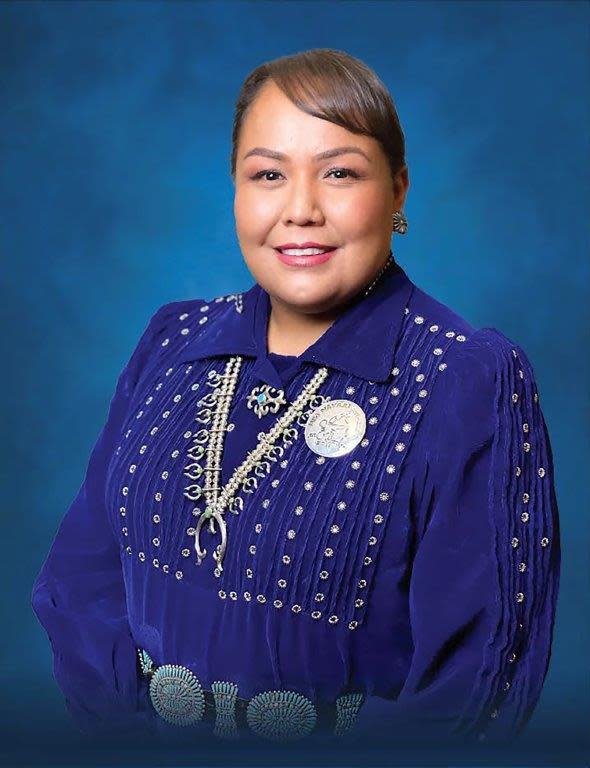Bills to toughen Arizona sober living laws are only a start, Indigenous leaders say
- Oops!Something went wrong.Please try again later.
- Oops!Something went wrong.Please try again later.
- Oops!Something went wrong.Please try again later.
Arizona could strengthen its regulation of sober living homes this legislative session, but Indigenous leaders say it would only be a first step in repairing the harm that a massive fraud scheme inflicted on their communities.
"This sets the tone, but a lot more needs to happen," Crystalyne Curley, speaker of the Navajo Nation Council since January 2023, said of the sober living proposals making their way through the legislative process.
"I can feel the frustration of these families who already had a mistrust of government. The bad actors took advantage of a system the state created."
Curley, who lives in the rural Navajo community of Low Mountain, said she wants to see major reforms of Arizona's Medicaid program. Curley and other Indigenous leaders also want to see reparations to the people and their loved ones who were wronged by the scandal, which is estimated to have cost taxpayers between $1.5 and $2.5 billion.

State Rep. Matt Gress, R-Phoenix, sponsored the latest iteration of a proposal to toughen sober living home laws. Gress' strike-everything bill, House Bill 2317, passed by the state's House and Human Services Committee, is companion legislation to Senate Bill 1361, sponsored by Sen. Frank Carroll, R-Sun City West.
The Gress and Carroll bills call for increasing the cap on civil penalties for state sober living home violations from $500 to $1,000 per offense.

One of the most significant provisions of the proposed law requires the Arizona Department of Health Services to contact local jurisdictions to make sure the home is compliance with all local zoning, building, fire and licensing ordinances before it could issue a sober living home license or license renewal.
"It forces the conversation between the Department of Health Services and the local zoning jurisdiction," Gress told the House Health and Human Services Committee Feb. 15, emphasizing that his bill will need more input from stakeholders, as well as widespread bipartisan support.
State Rep. Julie Willoughby, R-Chandler introduced House Bill 2111, a proposed law that addresses sober living home ownership changes because of the "bad actors" who have been operating sober living homes and then reopening new ones when they run into problems, she told fellow members of the House Health and Human Services Committee on Jan. 29.
"They are opening up businesses, not living up to the state-required standards, then they are either selling, transferring or closing down and then reopening somewhere else, causing a lot of problems and heartbreak and not serving the patients that they are supposed to be serving," Willoughby told the committee.
Willoughby's bill would hold existing owners accountable for court, administrative and enforcement actions even if the home is being transferred to new ownership. The bill also says the state can't approve a change in sober living home ownership unless there's been a transfer of "all legal and equitable interests, control and authority."
Another sober living bill introduced this session, Senate Bill 1655, sponsored by Sen. Theresa Hatathlie, D-Coal Mine Mesa, and passed Feb. 13 by the Senate Health and Human Services Committee, would increase state sober living home penalties higher than the level that Gress and Carroll proposed: from $500 to $10,000 per violation. Hatathlie's bill would also establish an "Indigenous Peoples Protection Revolving Fund" to "support resiliency and healing of Indigenous peoples in Arizona, consisting of monies received from civil penalties assessed against health care institutions."
The bill's language referring to "health care institutions" does not technically include sober living homes, per the Arizona Department of Health Services, but Hatathlie says that was the intent and she is working on amendments to include sober living homes, too.
Hatathlie, who is a member of the Navajo Nation, said in an interview with The Arizona Republic that she's been working to get the word out about the scandal since she took office in January 2022, and that no single piece of legislation is going to address the damage that it has caused.

Sober living scams have been going on for years, but the illegal activity ramped up during the COVID-19 pandemic, Hatathlie said. State officials have said fraudsters fleeced Arizona's Medicaid program primarily by targeting its American Indian Health Program, which makes the dollar amount of the fraud even more staggering because the program comprises fewer than 10% of enrolled members.
Arizona's Medicaid agency is called the Arizona Health Care Cost Containment System and the scandal was announced May 16 at a multi-agency news conference, though Hatathlie said many people were aware of a problem for years before that.
"It's normal to have selective listening when it comes to issues that are raised by Indigenous people in the state of Arizona," Hatathlie told The Arizona Republic. "We could have, as state leaders, addressed this issue two years ago yet here we are in 2024."
Reports include sex trafficking, overdose deaths
There are reports of overdose deaths in the fraudulent facilities, of sex trafficking of vulnerable individuals trying to get sober, and of Indigenous people being coerced into white vans with promises of a free place to live, free meals and free addiction treatment. In many cases, investigators have said, there was no treatment.
And in some cases, victims of the scheme were given drugs and alcohol so that they'd stay longer in the sober living homes and the bad actors could bill Medicaid upwards of $1,000 per patient per day for non-existent care.
Indictments cases to date include federal charges against a New River couple for allegedly setting up a counseling service in Mesa that brought in about $12.5 million in Medicaid billings for 185 individuals over two years.
A federal search warrant affidavit says the couple "lured" people into their counseling center by offering free food, housing, transportation and other items, which is "not a typical practice for a legitimate outpatient counseling facility." The affidavit alleges that the couple, Thvoughn Lynden Curry, 31, and his wife, Alexis Daneen Curry, 32, used AHCCCS money to purchase eight homes, as well as numerous vehicles, plus clothing and jewelry.
Some of the sober living homes in the alleged scams were giving patients free room and board because they formed alliances with outpatient clinics that overbilled Medicaid, though that's not how sober living homes usually work. Most legitimate sober living homes charge residents a weekly fee and help residents find jobs to pay the bills.
211 help line for sober living victims has had more than 20,000 calls
While there are no exact reports of how many people were victimized by the sober living schemes, those needing help can access services by calling 2-1-1 and pressing 7.
Citing data from hotline administrator Tempe-based Solari Crisis and Human Services, AHCCCS officials said that as of Feb. 27, the hotline had received 26,367 calls and directly served 9,304 individuals with temporary lodging, transportation and/or referral to health care services.
The Phoenix Indian Medical Center set up a "Community Intake Center" for victims of the fraud after the May news conference and it has since seen more than 700 people, according to officials with the U.S. Department of Health and Human Services. The intake center, a modular building, continues to see about five people a week per the federal agency, suggesting that some fraudulent sober living activity may still be happening.
Curley said that even in her small, rural community, she has heard stories of residents and their family members being victimized by the scheme, including a Navajo man in his 40s who was held "captive" in a facility in the Valley after being picked up by non-Indigenous sober living recruiters while he was in Gallup, New Mexico.
"They said, 'We'll take you to Phoenix and give you shelter, food and help with your behavioral health needs.' It sounded like a good idea," Curley said.

"They took away his cell phone and his identification. ... They provided him with alcohol. He was gone for five months," she said.
The man was able to get out of the sober living home and hitchhiked back to the Navajo Nation, surprising his family who had spent months trying to track him down, Curley said.
The scandal was like history repeating itself, where non-Indigenous people preyed on Native Americans, Curley told The Republic in a recent interview.
She compared what happened to the boarding school scandal of the 20th century, where the federal government forced Indigenous children to live away from their families, to stop speaking in their Native language and to give up their traditional clothing.
"It's history repeating itself with a different type of exploitation," Curley said. "There's frustration back home that it goes into the stereotype of alcohol and drug use and a population that's easy to prey on."
Even though alleged criminals took advantage of the Medicaid dollars that were available, Curley reiterated that Arizona created the system that allowed the fraud to happen and that allowed Indigenous people to become the scheme's prime targets.
"What's happening right now is a first step, and will show how legislators think about this problem," Curley said of the sober living home bills. "It's building a foundation for other things that need to happen."
Reach health care reporter Stephanie Innes at Stephanie.Innes@gannett.com or at 480-313-3775. Follow her on X, formerly known as Twitter, @stephanieinnes.
This article originally appeared on Arizona Republic: Arizona bills aim to curb the sober living fraud that bilked taxpayers

